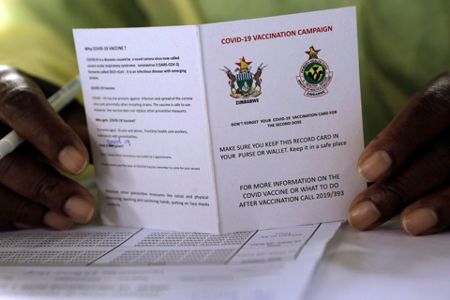Zimbabwe has been vaccinating people against COVID-19 since February 2021. By March 31, 2021, some 76,995 people had received their first doses of the vaccines.
Here are some important facts about COVID-19 vaccination and how people should conduct themselves after getting vaccinated:
Does one need to maintain COVID-19 safety measures after being vaccinated?
While clinical trials of vaccines that have received emergency use authorisation around the world have proved that these vaccines protect people against serious illness, the World Health Organisation (WHO) encourages people to continue taking precautions – wearing face masks, regularly cleaning hands, maintaining physical distancing and avoiding huge gatherings.
The United States Centres for Disease control and prevention also recommends fully vaccinated people to practice social distancing measures and wear masks when in public areas. This is particularly vital when visiting other unvaccinated people who are at high risk of contracting the coronavirus.
Is it necessary for the health personnel administering the injection to wear gloves?
The WHO Best Practices for Injections and Related Procedures Toolkit says the use of gloves is not recommended for intramuscular injections, unless there is a reasonable expectation of infection.
All COVID-19 vaccines currently in use around the world are administered through intramuscular injections.
“When undertaking injections, DO NOT use gloves for routine intradermal, subcutaneous and intramuscular injections if the health worker’s skin is intact (and/or) if the patient’s skin is intact,” reads the WHO toolkit.
In the US, the CDC’s advice on administering injections is based on the American government’s regulations.
According to the Occupational Safety and Health Administration (OSHA), “gloves are not necessary when giving routine injections as long as hand contact with blood or other potentially infectious material is not anticipated. If bleeding is anticipated and the employee is required to clean the site following injection, then gloves must be worn.”
“At a minimum, gloves must be used where there is reasonable anticipation of employee hand contact with blood, other potentially infectious material, mucous membranes, or non-intact skin; when performing vascular access procedures; or when handling or touching contaminated surfaces or items.”
Where they are worn, gloves must be changed in between injections.
Other health agencies caution that if used improperly, gloves might actually spread germs as they may discourage proper hand hygiene.
What happens if you miss the second Coronavirus jab?
All approved COVID-19 vaccines, with the exception of the one developed by Johnson & Johnson which is a single-dose vaccine, require that a person takes two doses for optimal effectiveness.
The vaccine doses have intervals ranging from 21 days to 28 days.
The Sinopharm and Sinovac vaccines currently being administered in Zimbabwe have 28 day intervals between shots, while Sputnik V, which has also been approved for use in the country, has a recommended period of up to 8 weeks in between jabs.
India has also changed its recommendation of the interval between its domesticated AstraZeneca vaccine, Covishield, moved from 4-6 weeks to 6-8 weeks. Covaxin, India’s locally developed vaccine that has also been cleared for use in Zimbabwe, has a 28-day gap between inoculations.
The CDC recommends that if one misses their second dose for any reason, they should try to get it as soon as possible.
“Up to 42 days between doses is permissible when a delay is unavoidable,” the CDC says.
The United Kingdom government says if the course is interrupted or delayed, it should be resumed using the same vaccine, but the first dose should not be repeated.
Can you get two different vaccine doses?
Current advice from most health agencies and experts is to stick with one vaccine.
The latest guidance from the CDC is that vaccines are not interchangeable.
“The safety and efficacy of a mixed-product series have not been evaluated. Both doses of the series should be completed with the same product,” the CDC says in guidance updated on March 5, 2021.
Some governments, such as in the UK, make exceptions under certain specific circumstances.
“For individuals who started the schedule and who attend for vaccination at a site where the same vaccine is not available, or if the first product received is unknown, it is reasonable to offer one dose of the locally available product to complete the schedule. This option is preferred if the individual is likely to be at immediate high risk or is considered unlikely to attend again,” the UK says in its COVID-19 Greenbook.
There are currently some studies to examine the effectiveness of a mixed and matched COVID-19 vaccine regimen.
For now, the advice is to keep to two doses of the same vaccine.
I have recovered from COVID-19, do I need the vaccine?
Yes, you should be vaccinated regardless of whether you already had COVID-19. That’s because experts do not yet know how long you are protected from getting sick again after recovering from COVID-19. Even if you have already recovered from COVID-19, it is possible—although rare—that you could be infected with the virus that causes COVID-19 again.
I have underlying conditions, can I be vaccinated?
People with some underlying/chronic conditions have been shown to have increased risk of severe COVID-19 illness and should, therefore, seriously consider getting vaccinated. However, people with underlying conditions are advised to consult their doctors before proceeding with vaccination.
Are vaccines safe for people living with HIV?
Yes, according to UNAIDS, COVID-19 vaccines under development or approved by regulators are believed to be safe for most people, including people living with HIV. There is therefore no reason why people living with HIV should not take the vaccine when offered it.
Can I get the vaccine while I have an active COVID-19 infection?
People with COVID-19, whether with symptoms or without them, should NOT be vaccinated. They should wait until they have fully recovered from the infection.
What is the WHO’s position on the vaccines in use in Zimbabwe?
On March 31, the WHO’s Strategic Advisory Group of Experts (SAGE), which advises the WHO on vaccines, announced that data presented by Sinopharm and Sinovac showed a level of efficacy and safety that is compatible with WHO standards. Recommendations were expected by the end of April.
Do you want to use our content? Click Here












